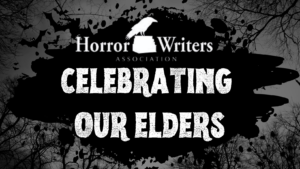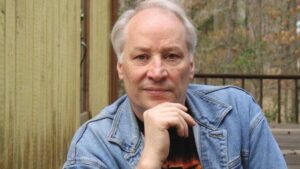Celebrating Our Elders: Interview with Joe R. Lansdale


Photo Credit: Karen Lansdale
Joe R. Lansdale is the author of fifty novels and four hundred shorter works, including stories, essays, reviews, film and TV scripts, stage plays, introductions, and magazine articles, as well as a book of poetry. His work has been made into films, animation, and comics, and he has won numerous awards, including the Edgar, Raymond Chandler lifetime award, numerous Bram Stoker Awards, Lifetime Horror Award, and the Spur Award.
He lives in Nacogdoches, Texas with his wife, Karen, and pit bull, Rudy.
The viewpoints expressed in this interview are the opinions of the individual being interviewed and do not necessarily represent the views of the Horror Writers Association.
Did you start out writing or working in the horror field, and if so why? If not, what were you writing initially and what compelled you to move into horror?
I did blue-collar jobs until I could make a living. I started out by writing nonfiction articles and moved to fiction in the seventies. I wanted to write science fiction initially, but I loved horror, there just weren’t many horror markets then. I would have combined the two, I think. I actually wanted to be a crime writer and science fiction writer, and then horror became popular and there were markets. I only wrote two or three horror novels, but I wrote a lot of short stories that were in horror markets. Liking the genre, and looking for places to sell my stories, some of which were solidly horror, and most of which bordered the field, I went for it. By the mid-eighties, I was writing things like The Magic Wagon, and one that is sort of horror, sort of science fiction, sorta satire, sort of comic, and so on. I moved back to writing crime mostly and kept up with writing some horror short stories.
Who were your influences as a writer when you started out and who, if anyone, continues to influence you?
Growing up, Edgar Rice Burroughs. I already wanted to be a writer, then reading him I felt I had to be. Others were Kipling, Jack London, Mark Twain, Richard Matheson, Robert Bloch, Charles Beaumont, Ray Bradbury, Gerald Kersh, Flannery O’Connor, Carson McCullers, Hemingway, Faulkner—a little—F. Scott Fitzgerald, especially The Great Gatsby and short stories by him. Rod Serling led me into a lot of the stuff that interested me, as did Alfred Hitchcock and The Outer Limits. Comic books were major influences. Twain became more important as time went on, Raymond Chandler, Charles Portis, Dashiell Hammett, James Cain, so many more.
How have the changes in horror publishing over the past decades affected you?
They haven’t. I’ve always written a lot of things, so there always seems to be a gate open somewhere that I can go through. I pretty much just do what I want, and except when I was learning in the seventies and early eighties, I guess I always have. I’m fortunate in that there always seems to be a market for my work. I also work in film and television and comics, even did a book of poetry and wrote some stage plays.
Do you think you’ve encountered ageism? If so, how do you counteract or deal with it?
Some, yes. Nothing that’s derailed me, but some that has aggravated me. Nothing severe enough to talk about, but yeah, it pops up from time to time.
What do you wish you knew when you were just getting into the field?
If I had known more I might not have made a career out of it, but I bet I would have. I never wanted to do anything else except martial arts, and have done them both in one way or another all my life. I never met another writer, editor, publisher, or anyone in film, until my career was off and running. Done it all by reading and writing, sending it out through the mail. Eventually, I did meet people in all those positions, but I had already established myself as independent. Never considered myself truly within any group, though some had tried to tag me. I think the tags do nothing for you but freeze you in amber. No splatterpunk, horror labels for me. I’m a writer that writes in those genres, but others as well, so the labels are only correct in the moment. I am the Lansdale Genre, for better or worse.
Do you have any advice for writers just starting out?
Read a lot, and not just in the field you want to write. And live your life. Don’t end up with the stink of the library on everything you write. Writing should be informed by reading, but it should also be informed by experience, which doesn’t mean you have to sail around the world on a log or climb the highest mountain in Bermuda shorts. It means you have to live life.
Do you think older characters are represented fairly and honestly in horror fiction?
That depends on the writer. When I was in my forties, I wrote Bubba Hotep, which is about aging and death, and now that I’m in my seventies I find it to have been true and accurate. You don’t have to be someone, their age, sexual orientation, race, to write well about others and their predicaments. You have to be human and to have been observant. We all have the same needs at the core, the same hopes and expectations. How we deal with it is individual. There is no such thing as definitive or collective groupthink.
What are some of your favorite portrayals of older characters?
I’ll cheat and say Bubba Hotep, as it was filmed, and the film really does the job well. The Old Man and the Sea, though not my favorite Hemingway work, does well with it, and some of his short stories. Ray Bradbury touched on it in some of his fiction, and he was good. The list could go on.
Do you have anything you’d like to add that we haven’t asked?
I do not. Read and write on.



